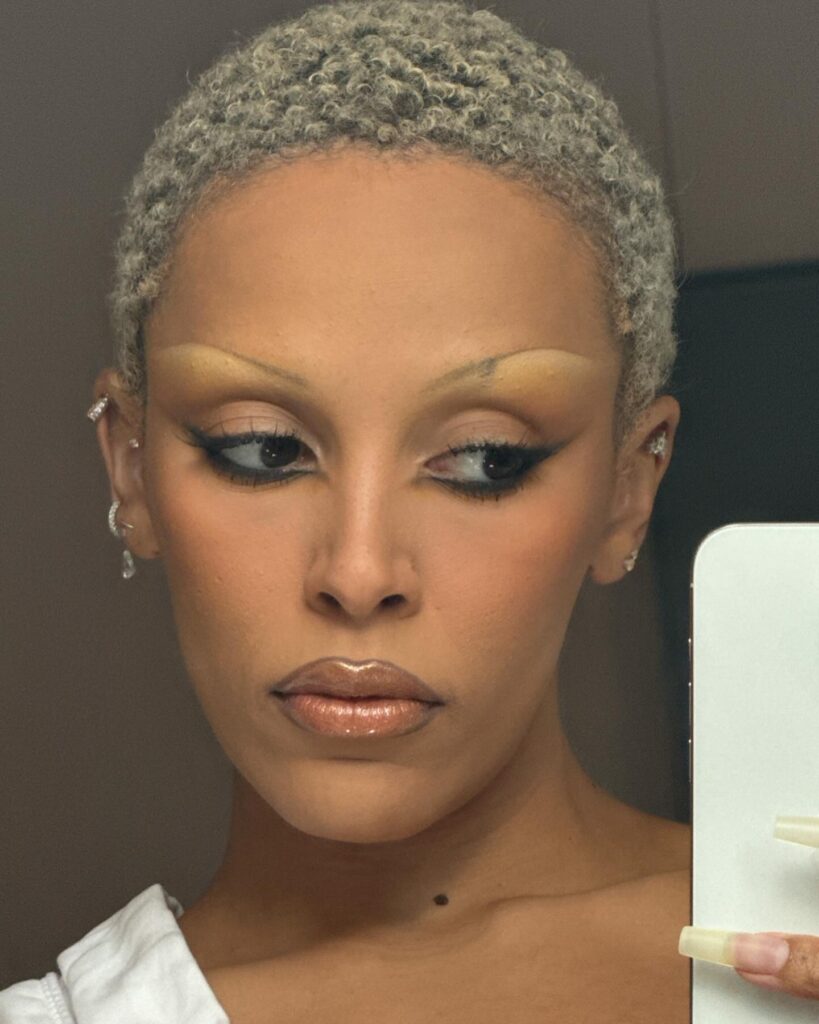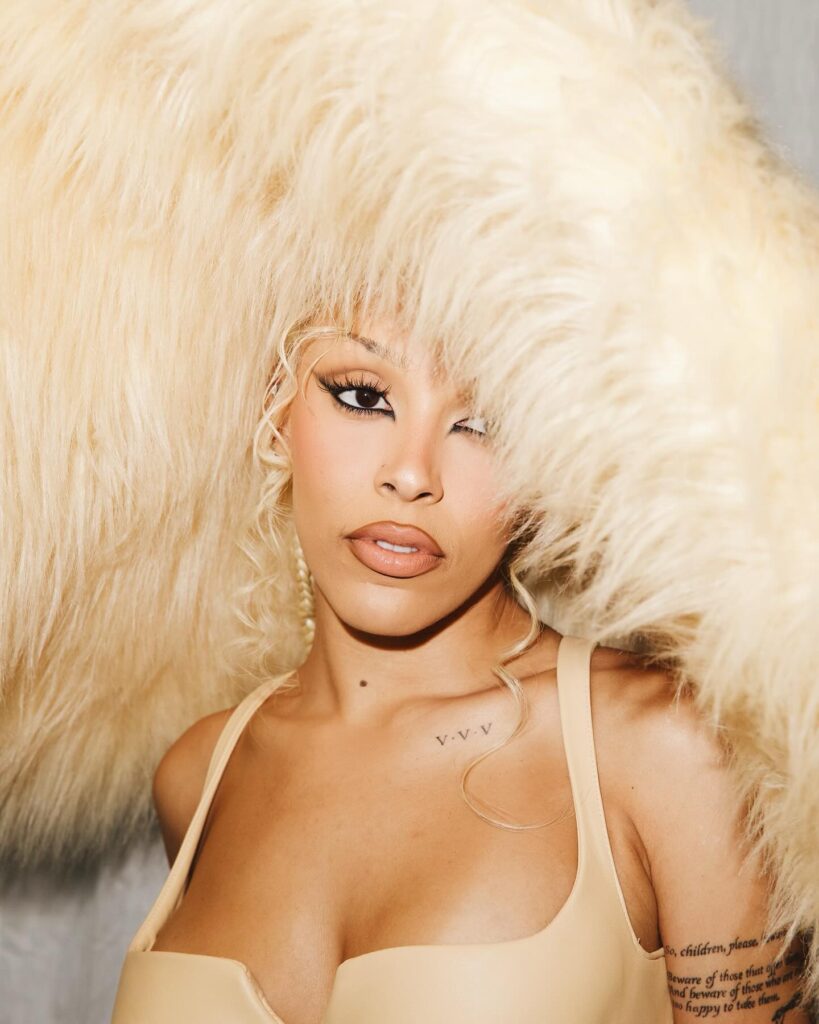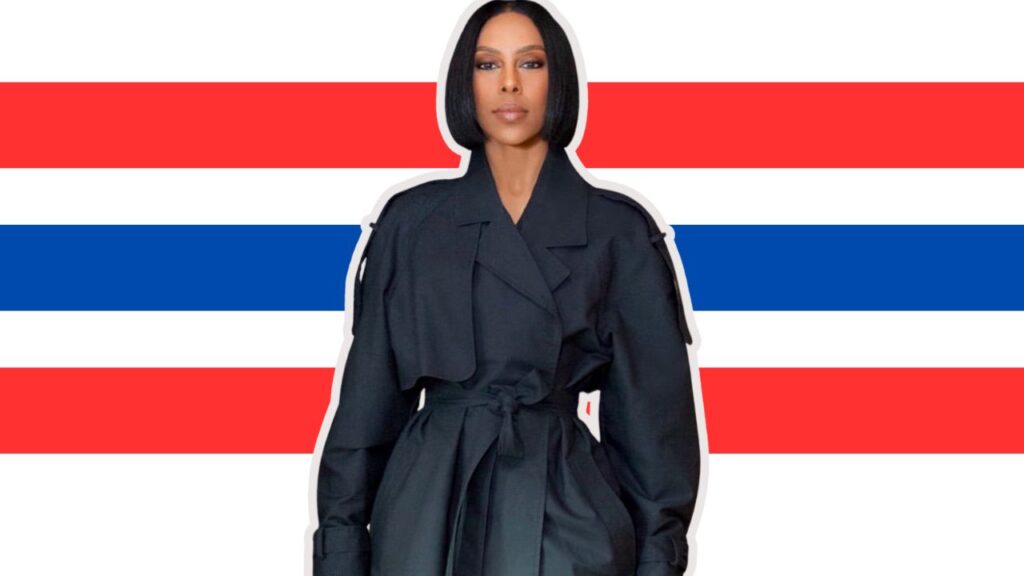
Doja Cat, born Amala Ratna Zandile Dlamini, is a celebrated American singer, rapper, and songwriter known for her eclectic style and viral hits. Her unique sound, which blends pop, hip-hop, and R&B, has made her a standout artist in the music industry. Born in Los Angeles, California, Doja Cat’s nationality is American, but her heritage and family roots are diverse, reflecting a rich blend of cultural influences. This article explores Doja Cat’s nationality, heritage, and family roots, providing an in-depth look into her background.
About Doja Cat

| Attribute | Details |
|---|---|
| Full Name | Amala Ratna Zandile Dlamini |
| Profession | Singer, Rapper, Songwriter |
| Date of Birth | October 21, 1995 |
| Place of Birth | Los Angeles, California, USA |
| Nationality | American |
| Ethnicity | Mixed (Jewish and South African) |
| Genres | Pop, Hip-Hop, R&B, Rap |
| Years Active | 2013–present |
| Notable Works | “Say So,” “Kiss Me More,” “Woman,” “Need to Know” |
| Awards | Grammy Awards, American Music Awards, Billboard Music Awards |
| Current Residence | Los Angeles, California, USA |
Doja Cat has become a global sensation, known for her bold artistic choices and genre-defying music. She first gained attention with her viral track “Mooo!” in 2018, and since then, she has continued to push boundaries in the music world with her innovative sound and captivating performances.
What is Doja Cat’s Nationality?

Doja Cat’s nationality is American. Born on October 21, 1995, in Los Angeles, California, she is a U.S. citizen by birth. Her American nationality has been central to her identity as an artist, influencing her music and her approach to her career. Growing up in the culturally diverse city of Los Angeles, Doja Cat was exposed to a wide range of musical influences, which helped shape her eclectic style.
While Doja Cat’s nationality is American, her ethnic background is a blend of Jewish and South African heritage. Her mother, Deborah Sawyer, is of Jewish descent, while her father, Dumisani Dlamini, is South African and of Zulu descent. This diverse heritage has played a significant role in shaping Doja Cat’s identity and musical style, infusing her work with a unique blend of cultural elements that resonate with a broad audience.
Doja Cat often embraces her mixed heritage in her music and public persona, incorporating a variety of cultural influences into her work. Her songs frequently showcase her versatility, blending genres and styles that reflect both her American upbringing and her diverse ethnic roots. This fusion of cultural influences has allowed her to connect with fans from all over the world, making her a truly global artist.
Family Roots of Doja Cat
Doja Cat’s family roots are a tapestry of cultural diversity. Her father, Dumisani Dlamini, is a South African actor, composer, and film producer best known for his work on the musical Sarafina! and his contributions to South African entertainment.
Dumisani’s heritage is Zulu, one of the largest ethnic groups in South Africa, known for its rich cultural traditions and history. His artistic background and cultural heritage have had a profound influence on Doja Cat’s musical sensibilities and creative expression.
Doja Cat’s mother, Deborah Sawyer, is an American of Jewish descent and an accomplished painter. Growing up in a household that blended Jewish and South African cultures, Doja Cat was exposed to a diverse range of traditions, languages, and artistic expressions. This multicultural environment nurtured her creativity from a young age, allowing her to draw inspiration from her varied heritage.
The combination of these diverse cultural backgrounds has provided Doja Cat with a unique perspective that is evident in her music. Her ability to seamlessly blend different genres and styles reflects her understanding and appreciation of her mixed heritage, making her one of the most innovative artists in the contemporary music scene.
Where Does Doja Cat Live?
Doja Cat currently resides in Los Angeles, California, where she was born and raised. Los Angeles, a city known for its vibrant music and entertainment industry, provides the perfect backdrop for Doja Cat’s creative endeavors. Living in LA allows her to stay close to the heart of the music world, giving her access to top-tier studios, producers, and collaborators.
Los Angeles is also known for its cultural diversity, which aligns with Doja Cat’s eclectic style and influences. The city provides her with a dynamic environment that fuels her creativity and allows her to explore new artistic directions. Her residence in Los Angeles has been instrumental in shaping her career, providing her with the resources and opportunities needed to thrive in the competitive music industry.
About Doja Cat Family
| Family Member | Name |
|---|---|
| Father | Dumisani Dlamini |
| Mother | Deborah Sawyer |
| Siblings | Not Known |
| Spouse/Partner | Not Known |
| Children | None |
Doja Cat comes from a creative and culturally diverse family. Her father, Dumisani Dlamini, is a South African artist known for his work in film and theater. Although Doja Cat has spoken about the limited relationship she has had with her father, his cultural influence is still an important part of her background. Her mother, Deborah Sawyer, is an American painter whose artistic sensibilities have clearly influenced Doja Cat’s own creative pursuits.
While not much is publicly known about her siblings or extended family, Doja Cat has often spoken about her upbringing and the influence of her parents on her music and style. The blend of her father’s South African cultural heritage and her mother’s Jewish-American background has provided her with a unique perspective that is reflected in her music.
Controversy in Doja Cat’s Life
Doja Cat’s career has not been without controversy. She has faced backlash for several incidents, including past social media posts and her participation in online chat rooms, which some interpreted as controversial. Additionally, Doja Cat faced criticism for some of her comments on race and her perceived use of racial stereotypes in her music and public statements.
In response to these controversies, Doja Cat has issued apologies and attempted to clarify her statements, often expressing regret for any offense caused. Despite these setbacks, she has continued to focus on her music and artistic growth, demonstrating resilience and a commitment to her craft.
More Info About Doja Cat

Doja Cat’s rise to fame is a story of talent, creativity, and a deep understanding of the digital landscape. She began her music career by releasing tracks on SoundCloud as a teenager, quickly gaining attention for her unique sound and style.
Her early work combined elements of hip-hop, R&B, and electronic music, setting her apart from her peers. Her breakout single “Mooo!” went viral in 2018, showcasing her playful personality and ability to create catchy, meme-worthy content. This track, while humorous, displayed her innovative approach to music and her willingness to push the boundaries of genre and style.
Following the success of “Mooo!,” Doja Cat released her debut studio album Amala in 2018, which included the hit single “Juicy.” However, it was her second album, Hot Pink, released in 2019, that truly established her as a force in the music industry.
The album featured the chart-topping single “Say So,” which became a viral sensation on TikTok and earned her a Grammy nomination. Her ability to leverage social media and digital platforms has been a significant factor in her rapid rise to fame, allowing her to connect with a younger, tech-savvy audience.
Doja Cat’s continued success can be attributed to her versatility as an artist. She has proven herself capable of creating hits across multiple genres, from pop to rap to R&B. Her third studio album, Planet Her, released in 2021, further showcased her ability to blend different sounds and styles, solidifying her position as one of the most innovative artists in contemporary music.
With multiple awards, including a Grammy, Doja Cat continues to push the boundaries of what is expected in the music industry, embracing her diverse background and using it to inform her art. Her journey reflects a deep commitment to authenticity, creativity, and a fearless approach to her craft.


